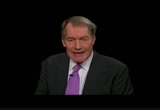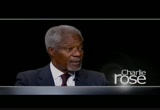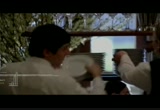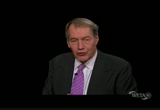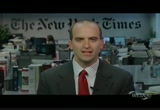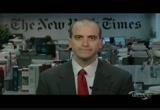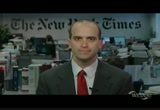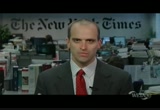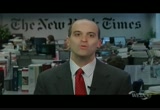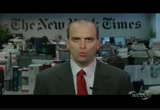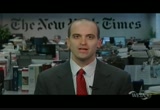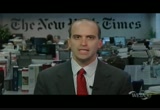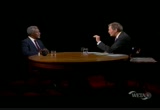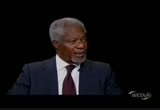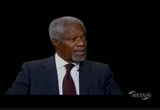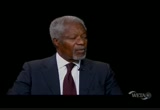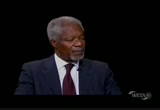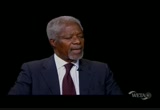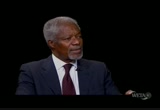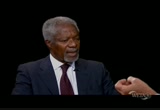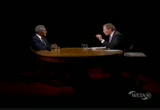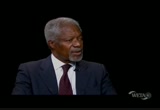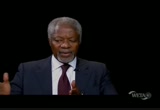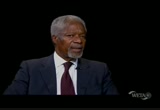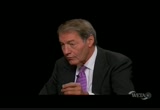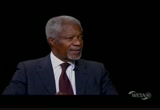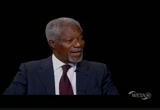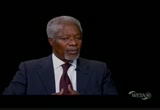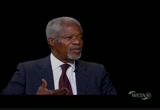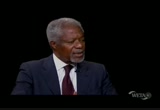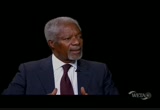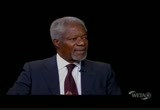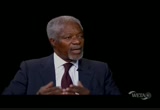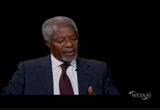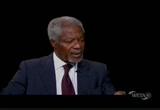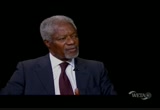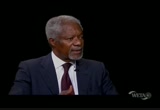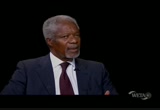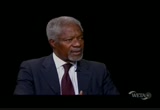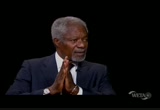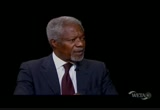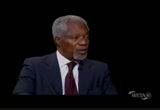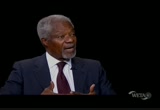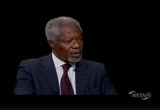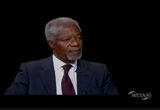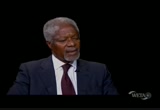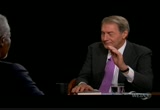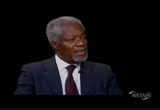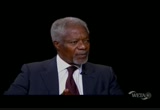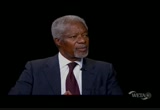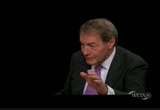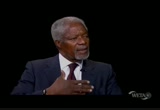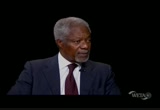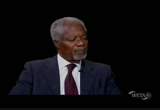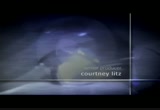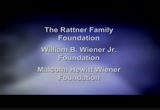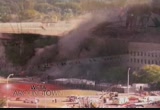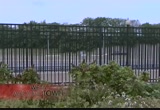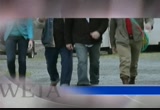tv Charlie Rose PBS September 11, 2012 12:00pm-1:00pm EDT
12:00 pm
for al gore to take credit for how well the economy was doing. because it was discordant with all of the news. similarly this year or maybe i should say on the flip side this year, as weak as the economy is, it has been improving over the last year. and so when people talk about are you better off than you were four years ago f you look at history, talk to pollsters most people instead seem to think about the question more like are you better off than you were maybe a year ago. >> rose: we continue with kofi annan, his book is called interventions, a lifetime in war and peace. he was recently the u.n. envoy to try to find a
12:01 pm
solution to the conflict in syria. >> charlie, less's be honest, be very frank, syrian situation is a tough one. there are no easy answers. in a way the russians and the chinese have become a welcome alibi. if they had said we have no problem, do what be you want what would have happened? what would we have done. >> what do you think would have happened? >> i don't think the system for intervention. the people on the ground are waiting for intervention, as some see intervention along the lines of libya i don't think that is a solution in syria. i think you make the situation worse. and many countries are not prepared to go in and do that. >> rose: the u.s. economy, syria, and the life of the secretary-general when we continue. >> funding for charlie rose was provided by the knoll
12:03 pm
>> from our studios in new york city, this is charlie rose. all eyes will be on the federal reserve this thursday when it is expected to announce further monetary policy to boost the united states economy. after last friday's disappointing labor report there is a growing call for a robust response from the central bank which is the fed, financial markets have rallied with the expectation of a third round of bond buying known as cuan tative easing. but that option is controversial with the election two months away. joining me from washington david leonhardt, washington bureau chief of the "new york times". in 2011 he won a pulitzer prize for his columns on the u.s. economy. i'm pleased to have him back on this program. >> thank you, charlie. >> rose: so what might the fed do and what consequences might happen?
12:04 pm
>> well, the fed is now talking about doing a version of something it has already done a couple timesment people may have heard the phrase q e3 to refer to what this is n technical terms that is quantitative easing 3. let's skip the technical terms, in essence it would buy up assets. in the course of buying up assets it would try to reduce long-term interest rates. short trem interest rates are already essentially at zero, the fed moves them down during the crisis but because the economy continues to be so weak, what they're trying to do here is to give it a little bit of an extra nudge. and your question is really important one, which is what kind of an effect would it have. i think the sort of best guess is that it would have something greater than 0, but only a moderate effect. >> how long would it take them to have that effect? >> well, fed actions typically don't work immediately. so it takes some number of weeks or months to fully wash over the economy. but as you noted, stock prices are already rising in anticipation of the action.
12:05 pm
and so you can think of this as not taking effect on any one date the way a tax increase or tax cut would take effect. but in fact there is kind of a long spectrum of when it begins to take effect. and that actually has already begun. so if the fed doesn't act, we'll then get the reaction to that. but basically if you assume that the fed does act which most people seem to be assuming, then you would say that the stock pricing increases are already having effect. they're making people feel better, wealthier, making companies feel a little better. we'll see how much a difference it really makes. >> rose: people vote for what they think the future might be and whether they are optimistic about the trends. do you think that, could it have those kind of political implications? >> it could. and to some extent the fed really hates that. >> rose: yes, exactly. >> the fed f it had its druthers it wouldn't take if i action, i don't know, four, six months running up to an election. but by no means it's that unusual they acted in september 26008 during the crisis. they acted in september of 1992. so it happens.
12:06 pm
the fed can't sit on the side lines just because there is an election going on. i think at this point it is unlikely to have a big effect on the election. i think you put it in the stew with the fact that gas prices have gone up sort of somewhat. you say barring a big surprise at this point, barring some shock that is bad news or barring the economy, all the data suddenly looking a lot better, i think we know basically the role the economy is going to play in this election. and it's somewhere, something of a toss up between the two candidates at this point. >> what does that mean, it's a toss up. >> well, the economy is obviously very weak, right. and so it's tempting on first blush to say well, it's a huge negative for obama. but i think when you look at history, what history suggests is that people tend to judge a president based on the sort of medium-term history. think about al gore in 2000. the economy was great in 2000. but it was also slowing sharply. and that made it really hard for al gore to take credit
12:07 pm
for how well the economy was doing. because it was discordant with all of the news that was coming out. and so similarly this year or maybe i should say on the flip side this year, as weak as the economy is, it has been improving over the last year. and so when people talk about are you better off than four years ago, if you look at history, if you talk to poll spers-- pollsters most people seem to think of the question as were you better off than you were maybe a year ago. when you look at it that way, the economy although it's by no means a big positive for obama which is why romney is talking about it and obama isn't, it's not clear that it's a huge stone around the president's neck. >> what's wrong with the u.s. economy? >> there's a short-term answer and a long-term answer. and if you laugh and you say well of course someone who follows economics would say that, that's fair. but the short-term problem is we had this huge bubble. it popped. and we have an incredibly long period of recovery. >> this is the subprime
12:08 pm
bubble that we're talking about. >> this is the sub prime minister bubble and more broadly the huge consumer bubble, right. the subprime is the most obvious version of it but there was also the consumer credit bubble. we just had this huge bubble. so you look at almost anything, look at car sales, look at appliance sales. look at home remodeling sales or home sales. none of them look anything like the way they did during that huge consumer bubble. and so what that tells you is that we had this great bubble. it popped and as is the case, almost inevitably when you have one of those bubbles pop, it takes years to recover from it. this is the rogueoff reinhart theory that we talked about on the show several times. that is the more immediate problem. but i do then think there are longer-term problems. we lost our lead as the countries that's the most educated country in the world. >> rose: right. >> we have various problems with our trading relationships with other countries. and i think sometimes people get a little mixed up here. in saying that, well, it's really this popping of the
12:09 pm
bubble that is our main problem. people who say that, i think the evidence is on their side. sometimes people go too far and they says that's our whole problem. it's not our only problem that is what is driving the unemployment rate right now. the deficit and education troubles and all these other things, they are major problems that are playing a role now and will be with us for decades to come. >> what specifics do you want to know? because you foe something about the economy. >> from romney i would really like to know what he plans to do with taxes. my colleagues david-- had a really nice story about this on the front page of the times on monday rses let me interrupt you. because i want to read from that because i have it right here in front of me. >> great. >> rose: if any single question, this is their opening sentence f any single question can be said to dominate the presidential campaign, it is whether the conservative policies advocated by mitt romney would help or hurt the middle class. and no issue hits the heart
12:10 pm
of that question more than taxes. mr. romney says no middle income americans will have their tax bill go up if he is president. president obama says the average middle-class family would pay as much as $2,000 a year more under the romney plan. it is a conflict that grew in prominence during the party conventions. pick it up from there. >> well, so romney has said he's going to cut everyone's tax rates by 20%. he said that's to the going to add to the deficit at all and it's to the going to increase the tax burden of middle class americans because he's going to get rid of tax breaks. what he hasn't specified at all are which tax breaks he's going to reduce or get rid of. the problem here is that the big tax breaks not only have powerful interests, but they are really popular with voters. and voters are-- . >> rose: mortgage deductions and that kind of thing. >> exactly. health insurance exclusions, savings for retirement. so when independent analysts have looked at romney's plan, they have said it is a rith metically impossible. he cannot cut taxes as much
12:11 pm
as he wants without raising the tax burden of the middle class, or increasing the deficit. he certainly could-- certainly could do a pack than-- package broadly along the lines of what he wants to do even if he can't exactly accomplish what he wants. but it's really impossible to know what he is going to do and to judge it if he won't be specific at all about what kind of tax breaks he would want to reduce or close. so from romney i would say, i would like to know that. i would also like to know specifically how he would pursue a different foreign policy from obama. he has criticize odd bama's foreign policy a lot without saying here is what i would do differently on iran, on afghanistan, on china. >> from obama -- >> on russia, but it is another example of how he said obama is wrong without saying-- . >> rose: and what specifics from the president. >> from obama what i would like to hear is he has these sets of priorities that we know he believes in pretty strongly. we know he wants to reform immigration. we know he wants to do
12:12 pm
something on cap and trade. we know that he views it as important if he had a second term to try to bring down the deficit. and what he hasn't done is sketched out, either politically how we go about that, because he has plenty of white papers on what he would like to do on immigration and cap and trade. but he's never said hey, i really care about this stuff and here's how i'm going to accomplish it. >> rose: david, thank you so much. >> thanks, charlie. >> rose: david leone hard. back in a moment, kofi annan. kofi annan is here. while serving as the 7th secretary general of the united nations he drove some of the institutions greates greatest -- but, his memoir is called interventions, a life in war and peace. it is a candid and powerful account of a remarkable career. having recently returned to global affairs as joint u.n. arab league envoy to syria he resigned his post this past august citing division in the international community as an obstacle to
12:13 pm
peace. his replacement travels to cairo today on his first mission. bra himmee inherits a deder-- deteriorating situation. a saad continues to turn heavy weapons on syrian neighbors hoods. dr. a con-- annan brings a perspective to these events. welcome. >> good to be here. >> rose: let me trace one thing before we talk about this book and syria and other events. tell me what you have done since you left the united nations, how you spend your life and -- >> i have done many things. i've been doing lots of work on agriculture. >> rose: right. >> we have an organization called the alliance for green revolution. in africa. we work with small scale farmers trying to improve their production. and we do that by giving them improved seeds, teaching them how to manage the use of fertilizers and
12:14 pm
water. and we also training african scientists to work on this, this is an alliance that came together. and the founding members are the gates, bill-- . >> rose: bill gates constantly tells me how much he is interested in agriculture these days. >> exactly. and he's been very active, bill and melinda gates and the rockefeller foundations. and we brought in other governments to work with us some i spent quite a bit of time on that. i also did mediation work in kenya, and sometimes offer advice to african governments on political conflicts. i do work on governance through a group called the africa progress panel. and right now i'm chairing a global commission on integrity of elections, democracy and security. and we are issuing a report in london next week so, from here i go to london for that event. >> rose: let me turn to syria. were you hopeful when you
12:15 pm
took this job? >> no, i knew it was going to be very tough. in fact, my wife and i were having dinner, sitting there quietly when the call came. and i said i needed to think about this for a while. and i knew hi been following it it and knew how difficult it was. but it was also difficult to say no. when you consider the killings, the tragedy, lives were at stake. and the situation syria was in. most people said it was an impossible task. and they probably weren't wrong. but i felt it had to be tried, one should try and do the rest. the international community was united and i told the secretary-general and the security council that this is a tough job. we can't perhaps do something but on condition that there is one mediation process that everybody supports. and the council remains united and puts sustained pressure on the parties. >> rose: what is it the russians want?
12:16 pm
>> i think you know, let m me-- back off a bit and say that the divisions in the council and in the international community has been very difficult to deal with. but the russians are not entirely wrong. i know with the tendency to blame the russians for everything, i've been talking to all sides. and in fact on the 30th of june we brought all the foreign ministers of the permanent members of the council to a meeting in geneva. in addition to the foreign ministers of the permanent five we had qatar, kuwait, turkey and iraq there, with the secretaries general of the arab league and the u.n.. and the whole idea was to review syria, not in the competitive sort of where this group supports but to come together to see how we can move forward.
12:17 pm
and we agreed on the need for political transition and political settlement. and came up with guidelines and principleses for political-- if you wish a road map basically saying there has to be an interim government, an interim government that will have full executive power. we need to try and maintain the security forces so that people will be protected and particularly in a situation where they also have chemical weapons. that has to be protected. as well as insurance that governmental institutions do not collapse. nobody wants a chaotic collapse. and everybody agreed. all, and they were to come to new york and endorse that agreement. that has not been done yet. >> why not? >> i think when they got to new york they did not focus on building on that substantive gain in again etcha. they got focused on reference to chapter 7 in
12:18 pm
the resolution. and the russians had told them and me in geneva at the end of june that they cannot accept chapter 7 because they feel that it is the beginning of a slippery slope. they compare this with libya. they felt they were taken for a ride in libya. >> rose: because the united nations did more than it-- he had felt the authority was given. >> that's correct. they felt that the resolution and its implementation morphed very quickly into regime change. and they don't want to see a repeat of that. both the chinese and russians feel very strongly about this. apart from other reasons they have for the syrian approach and policy. >> do they care what happens to bashar al-assad. >> no, i think they concede, they accept that assad will have to go and may have to-- . >> rose: so what role do they see him playing in this
12:19 pm
process. >> i think the main concern is that let's say once you have agreed on the political transition, let's for argument sake say that the transition period will be for a year. the difference between the western position and the russian position as i see it is that the west say as sad pus go. the russians say how does he go. the more you demand assad must go, the deeper he billings in. and then you tend to ask russians to make it happen. it's not possible. and we don't have that kind of-- we can do it but so let's say they want him out up front, as you start the process. the russians say have something in place to insurance that there is not a security collapse. so what they want, expect him to go three months into the process when an interim government has been established or what? this is where they should
12:20 pm
have sat down and discussed and see how they can work together to bring about the kind of political settlement which i see as the only solution. >> rose: with respect it sounds like you more understanding of their position. and think that their position hasn't been given full airing, more so than you believe the position of say the arab countries in the west. >> no, i think the, first of all, the west and the arab countries have a strong media presence globally. the russians don't share, have that. but i think the position of the russians have been sometimes too simplified. i mean i sat and discussed this issue also with the russians including with president putin. >> yes. >> in moskow in july. and i said look, for us syria has implications, almost seen as the backyard and that what happens in syria could have impact in
12:21 pm
russia and its neighborhood. and therefore they need, they are trying to make sure that it is handled properly. that's the way they argue it. it's handled properly and it's not chaotic. >> do you think this is also in the interest of the west and everybody. >> do you blame them more than-- i mean you seem to be understanding of the russian position and say -- >> without blaming anybody. >> yeah, without blaming anybody. >> i'm just saying one should also listen. >> rose: but you're saying that, is there something the west should do. >> charlie, let's be honest, be very frank. syrian situation is a tough one. there are no easy answers. in the way the russians and the chinese and the-- have become a welcome alibi, if they had said we have no problem, do what you want, what would have happened?
12:22 pm
what would we have done. >> rose: what do you think would have happened? >> i don't think there is-- for intervention. the people on the ground are waiting for intervention. as some see intervention along the lines of libyament i don't think that's a solution in syria. i think it would make the situation worse. and many countries are not prepared to go in and do that. the loss of webs are going into the opposition and now there are some who are saying let's send in weapons so that the opposition can defend themselves and take on the government. and as i watch what is going on i have a feeling we're going to see a long drawnout war leading to a stalemate where at the end of it they need to seek out the kind of political settlement we discussed in geneva. >> when i talked to the king of jordan in amman maim a month ago, he said built into this negotiating has to be some sort of recognition of the the allowites in
12:23 pm
terms of what happens to them. >> he is absolutely right. because for them it's an essential fight. when they say they are supporting asad blindly. they are a-- and this is why what one of the communique of geneva does was to try and indication-- indicate that if there is a political-- each group will be looked after. their interest will be looked after whether you are with christian, kurdish, and tell them this is the future. stop fighting. stop stop killing each other. it's not a winner takes all. we have an arrangement. we want you to work an arrangement that protects all interests, of all groups along the line you discussed with the king 6 jordan. >> rose: the big problem obviously is a major problem for everybody's chemical weapons. >> yes. >> rose: and who might get hold of them. not that the syrians might use them which is a big problem. >> although they said they would not use them.
12:24 pm
>> they told me directly. >> rose: they would not use them. >> they said they would not. >> rose: they being assad. >> yes, and his foreign minister. >> rose: okay. then the question becomes can they somehow fall into someone else's hands. >> no, that's worrisome. and this is something that has bordered the international community the past decade that weapons of mass destruction could get into the wrong hands. >> rose: right. >> and they will have no qualms about using them. >> rose: how big a threat is that in your judgement having worked on this? >> i think the loss of pressure on the syrians to make sure it doesn't get into wrong hands. the governments monetary and they are vigilant. >> we know where they are. >> they know where they are. >> rose: and they can't move them to some allowite enclave? >> well that i cannot say. because-- . >> rose: that's the fear. >> the situation is so fluid, there are so many militia and so many groups involved
12:25 pm
that it can happen. and this is a course of grave concern. >> rose: from talking to the number of leaders that i talked to in that region my impression is that if that is even closely, if they sense that that is going to happen they will go in to protect the chemical weapons. they will not allow them, they will do anything they can to stop that? >> i think they would do everything they can to stop that. >> rose: covert or overt. >> yeah, and perhaps they should but it's not going to be easy. >> rose: why. >> right now the syrian army is protecting them and has to protect them. but if the fighting gets really chaotic. >> rose: the war and all that. >> people may even run away from some of these weapons to protect themselves. >> rose: right. >> and this is why i'm saying, it can be quite messy. so when we talk of military solution and fighting it out, these are some of the risks we run into. >> rose: and if you are bashar al-assad what do you think your options are?
12:26 pm
>> i've sat with him, and at the beginning i felt he was in denial. and felt that what we were seeing on television was virtual reality. and the reality was what we were living in damascus. at that time damascus was very peaceful, no bombs. while we outsiders were concerned about what was going on inside, he was concerned about the outside and what outsiders are doing to syria. and felt if the outsiders will back off and not arm the opposition and not interfere syrians will solve their problem in no time. he also generally believed that he had the support of the people. and that if he didn't have that support, he wouldn't have lasted for over a year with all this conflict. but of course now we see the
12:27 pm
fighting. we see the civil war. >> rose: what are the iranians doing? >> the iranian os do have influence in syria. i think perhaps it's one of the strongest supporters of syria in the region. and this is why i believe we should try and pull them in and make them part of the solution. i know we couldn't get them to the geneva meeting because some countries did not want them there. but-- . >> rose: any country that we know? >> i think saudi arabia and the u.s.. >> rose: didn't want them. >> others did. >> rose: others did. >> the french wanted them. >> the french and the british eventually joined the u.s. position. >> rose: so you don't really know that they wanted. >> no, but-- . >> rose: eventually meaning after u.s. pressure or -- >> could be, yes. >> rose: i think they came under pressure. but the chinese, the
12:28 pm
russians. >> rose: one of the irans. >> they know the influence they have. and interestingly enough, the new egyptian president, president morsi suggested a quartet to come and work on the syrian problem. and guess which countries are there. iran, saudi arabia, turkey and egypt. he feels this quartet, he also sees the relevance of iran in this situation. i know, we have been busy forming friends of-- sir ya, he doesn't make peace with france. >> rose: suppose, and he obviously didn't do this and is unlikely to do it because the die may be cast as you have said, bashar al-assad came to you and said i want out of this for myself, family and friends. i want a safe haven. can you deliver? >> i personally-- no, when i was in the situation of an
12:29 pm
envoy, this issue came up. the question then was-- . >> rose: came up, how did it come up. >> not with him. other leaders discussing where does he go. some countries in the region said they will find a place for him without defining the place, he could go to. some suggested russia should take him. the russians have said no, they will not take him. >> rose: they said that at the table. >> exactly so we need to find a place. otherwise he, the sense of being trapped becomes even more acute. because where does he go to, and where can he go to and feel safe and feel that they will not, no one will come after him and hold him to account. but obviously that is a-- why they may, we may surprisingly find a place, somebody, some country that will take him. >> what do you believe brahimi can do?
12:30 pm
>> i think bra him sya very good negotiator. he is a wise man. i think he will have to sit-- . >> rose: even meaning you were not a good negotiator, not a wise machine. >> no, will have to bid his time. i have a feeling we got to this stage where either one is lucky and you have unexpected developments, either the army ships which i don't see at this time, and there is a break through that allows you to move in. or suddenly the parties are tired of fighting and they are so exhausted even if they have money. and the situation is ripe. >> rose: what makes you think can hold on though, and that this conflict is at a stalemate? >> i think if can hold on f he has genuine and honest support of the security council members and the international community as
12:31 pm
well as he-- . >> rose: he? >> he had brahimi, can hold on to what he is trying to do. >> rose: i'm asking why is the game on the ground going to be a stalemate? why isn't the free syrian army going to win? >> i don't think as i see it today, neither side given the alignment of forces on the ground, neither side has the capacity to produce that knockout punch that brings a war to an end, suddenly, conclusively. i think it's going to be a long, drawn out conflict. we've seen what has happened. >> rose: but what could change that equilibrium? >> nothing on this the assad side. he's not going to get more help. >> he's not getting more help. he's not getting more help. >> rose: you have to assume something will happen on the side of the position. >> the rebels. >> it's possible. they are getting more weapons and more
12:32 pm
sophisticated weapons. but often with, and both sides seem to be equally determined. the will to fight is, has not diminished on either side. we hear of the defections but it's not the kind of defections that should weaken the assad regime if you were to tell me a general has defected and is taken his men with him, he's taken 5,000 brigade with him, he's taken a battalion. then you're beginning to see something. >> rose: the beginning of the end. >> exactly, individuals and others. >> rose: writing this book, interventions, a life in war and peace, what was the most difficult thing to revisit? >> there were a couple of difficult issues. the peacekeeping operations of its 90s. rwanda and bosnia. >> rose: you view that as a mistake. >> and iraq.
12:33 pm
not as a mistake as such, but it was our failure. our failure in the sense that we couldn't help or do as much as we could to protect the people. and often they say it's the u.n.'s fault or they didn't give-- but as i explain in the book, the u.n. has no standing army. we need to rely on governments to give us the troops we want. we often go in lightly armed with lightly armed troops. and we ourselves have to the been able to lower expectation and explain to the people what we are there for. so sometimes they would expect a couple of battalions of the u.n. to do incredible things, you know. i mean and when the failure comes, our member states don't speak up, you know. it's the organization, the secretary-general and the team and i try to explain to people that there are two
12:34 pm
u.n.s. the u.n. made up of member states who give us the mandate and the secretariat that implements it. and we can be as the organization can be as strong as the member states want it to be. and in both situations, we didn't have enough capacity on the ground. there were again divisions amongst the member states as to policy, when you look at bosnia, where there was effective military on the ground, the countries with troops on the ground did not want air cover. the u.s. which did not have troops on the ground wanted to use air power. and of course u.n. troops had been taking hostage so it took us a long time to work out the division and give the soldiers air power and to use effective air force. >> in rwanda we didn't have the capacity. regardless of the warning that came in. >> rose: so you didn't make a major decision that you deeply regret?
12:35 pm
>> no, i think the decisions that were tough for us take the rwandan case. we could have gone to the press. and at that time the u.n. was very-- in its relationship with the media. we could have used the media shouting from the rooftops to say what is happening. and even if the governments were not giving us the resources, the people may have pushed them to do something. we didn't do that. and you know, you scratch your head as to whether you did everything that was possible. and then maybe we could have done, got a bit more with real media campaign, now that we are into it. and bosnia, in veb veb we didn't have have the forces, when we were given the pan date. and by the way, i wasn't the secretary-general thenment but when we were given the mandate maybe we should have
12:36 pm
said we cannot do this without the resources that are need. but of course, you get your mandate from the council. and they can easily for example, one of the reasons if you set up a safe haven to try and protect the people and then you come in and ask for 35,000 troops, and say nobody's going to give you that number of troops, and they pick the lowest number of troops and then amend the resolution to say the soldiers should use the oppressers to disuede attacks which is quite different from protecting. and so you set yourselves up and also set the people up giving them a sense of security when one doesn't have the means to protect. >> is the doctrine, the doctrine that you enunciated while you were secretary-general on sovereignty, is that a proud
12:37 pm
achievement? >> yes, i'm very pleased with that. because it does two things. it's a warning to auto crats and dictators that in today's world you cannot hide behind sovereignty to brutalize your own people. sovereignty will no longer save as a shield. and that if you do, the international community may intervene but intervention doesn't mean necessarily use of force it could be political, diplomatic, economic. and you use force as a last resort. but that concept of responsibility to protect also imposes responsibility on those of us outside that particular-- . >> rose: to do what. >> it's really telling us that you can no longer stand by and say it's an-- internal affair. you cannot say that this does not concern us. unless some crimes are so shameful that you simply have to find a way. >> rose: but i mean i hear the russians when they come
12:38 pm
to this table, the ambassador to the united nations, constantly bring up the question of sovereignty as one of the reasons principleses that the russians believe in. they want to seek a solution but they have, they raise that flag as they had in kosovo. >> no, in fact, i'm sure russia is not-- . >> rose: china does too. china very much believes in it. >> but of course they have to understand that in today's world sovereignty endays responsibility too. it's not just privileges for the state. the sovereignty should entail responsibility to protect your own people and their welfare. you cannot have the privileges without the responsibility. and accept the rest of the world to embrace it. >> that brings me to iraq. a sad time for you? >> it was very sad. iraq was a sad time. it divided the organization in a man their i had not seen before. and that's why, the reason i worry about syria.
12:39 pm
i think syria is introducing-- . >> rose: as its pont of dividing, dividing between china, russia, and nobody else. who is on china and russia's side on this, iran, that's three. >> no, but we also need to be careful because quite a lot of the emerging countries in the council did not, when you look at the voting record they're much more nuanced and much more reticent. >> rose: give me an example. >> india didn't votes. you have had situations where south africa, which is also the nuance position. >> rose: nuanced position, diplomatic term. >> yes. but i think --. >> rose: the nuanced position. >> no, i think we, i really believe that the divisions which we have seen, i mean iraq was difficult but we were able to bridge it over
12:40 pm
time. it left syria strained. and what was really sad was the inability for the council and the authority to have been accepted so that we could have stopped that war. >> rose: how much pressure was brought to bear on you from washington? >> there was pressure. but i didn't feel it too much in the sense that i felt i had the right position. my position i was really not in favor of the war. and i was also talking to quite a lot, quite a few leaders around the world. i was on the phone all the time. and i knew their position too. and so i knew majority of the member states were not in favor of the war. >> rose: would they have been in favor if, in fact, the inspectors had continued, and there was a point in which the inspection had clearly failed? i mean-- has been here. >> yeah, i think that would
12:41 pm
have been my expectation. >> rose: if, in fact, they had ra lawed inspectors to go back even though iraqies had thrown them out. >> yeah. >> they went back. the inspectors went back. they were in the middle of doing their work when the u.s. and u.k. decided they are going to go in. >> rose: they had the ships outside. >> exactly. so they -- >> the council was interested. the council decided that saddam hussein had to perform. and if he failed to perform and cooperate with the inspectors there would be consequences. it was only logical that the council that took that decision should be the one to determine one, whether they complied or not, and if they were in breach, what the consequences should be. should the u.n. go in or should they encourage a coalition to do whatever. and for the u.s. and the coalition to go in and do it outside the council, in my
12:42 pm
judgement was against the charter and illegal. because a country can defend itself when attacked when there is imminent threat. but when it comes to broader issues of security for all of us, you cannot do without the legitimacy of the council. >> rose: you have gotten some attention because of what you said about colin powell. >> uh-huh. >> rose: what is it you are saying about him. >> yeah, i think it has to be clear, it must be understood, misunderstood. because i don't want-- it misunderstood. >> rose: what has been said about what you said. >> yes, because basically what i said was he walked into my office and said kofi, they've made an honest man out of me. we found some weapons of mass destruction. so really he thought it was vindication this was after he had made his presentation to the council. and for a while no weapons of mass destruction could be found. >> rose: saddam hussein acted as if he was a man who had weapons of mass destruction.
12:43 pm
>> oh, absolutely. >> rose: and we now know he did it because he didn't want people to know that he didn't. >> in fact, i said he didn't want to appear naked. he was in a bad neighborhood. in fact, one of the iranian diplomats when tariq aziz has asked why did you play this game. he said because of the-- and the jews. >> rose: is rannians and israelis. >> basically what he was saying is i'm powerful. i have weapons of mass destruction. don't mess with me. don't take me-- . >> rose: you think that is the reason the iranians want weapons of mass destruction. >> well, they claim they don't. >> rose: what do you think? >> it's difficult for me to say authoritatively that they are going for weapons of mass destruction. >> rose: i know that. nobody can say authoritatively because they haven't done it yet. >> yeah. >> rose: but they constantly
12:44 pm
do every their conduct suggests they do. so therefore when you look at their conduct, do you assume they do? >> conduct. >> rose: you look at the construct and i have also discussed with them. >> yes. >> rose: and also talked to some of the people that have been in the negotiations. and they may. they may be heading that way. the difficulty for those of us who want to check them and check them based on the fact that they are not cooperating with the atomic agency and they should not have weapons, it. >> if you have nothing to hide and are doing it for peaceful purposes, open up. let the inspectors go ef lee where. show them what you have. but as long as-- . >> rose: why do you think they don't that, if in fact we believe what they say y are they racheting up. >> yeah. >> rose: you know, everything that would be leading to it, if it's only for peaceful purposes. why don't they make agreements if it's only for
12:45 pm
peaceful purposes. i'm really asking because -- >> what you are saying make senses but on the other hand the attitude is why are we being -- . >> why-- one thing is they signed a treaty, a nonproliferation treaty. >> they signed it. but they feel that they are being picked on. they have the right to a scientific knowledge. and they are being even deprived of that. >> rose: so why don't we-- why don't we look at them in the way we might look at the north koreans and saddam hussein, when the whole idea, they don't want to be naked. they believe that if, in fact, they have nuclear weapons, nobody is going to attack them. >> although strangely enough just last week you heard what i tie tolah cha mainee said it is against our religion to have nuclear weapons. >> rose: they have been saying that to me for years. i heard the former president say that be, not just ahmadinejad, it's against our religion. >> i heard that and he repeated it again. >> rose: a man who was
12:46 pm
considered a reformer, right. >> i agree. but it's a tough one and this idea that one may go in and bomb is something that i'm not at all comfortable with. i think they should continue. >> rose: dow understand the israeli fears. >> i understand the israeli fears. >> rose: that it's not so much what they would do, again it's like syria, it's who else might find you know because of who some of their friends are. >> i understand their fears and i understand their anxiety. and the fact that the international community is trying to make sure this does not happen. >> rose: if you were an israeli prime would you like it to be said if they have nuclear weapons on your watch while you were prime minister. >> well, would you like it to be said that the region was blown up because of your action? >> then why is it that many arab states that you know and i know would like to say
12:47 pm
the they are ready to do something? >> i think you know-- . >> rose: they want them to do it because they don't want to see spiraling into proliferation world, which would be even more dangerous. >> and that is true. and you also know the tensions between the iranians and the arab states. >> rose: right, exactly. >> and we are seeing-- . >> rose: at rabia emirates. >> seeing some of it played out in syria at the moment. >> two things, this is fascinating for me. one because you have been there. you have been in the room. you know all these people. it is that if, in fact, there had not been an iraqi war. >> uh-huh. >> what might have happened? >> now that is an interesting. because you have a lots of leaders and countries in the region who believe that the biggest winner of the iraqi war, are the iranians, that iran had been handed over iraq and today you have a regime that is has replaced
12:48 pm
the sunni government. and this is also having an impact on what we are seeing in syria. >> rose: some argue the chinese were a beneficiary of that because they were out building their economy and not having to worry. and the united states was sort of drawn into both in terms of a loss to its treasury but others, and the terrible tragic loss to human life on both sides. >> i agree. and if that had not happened. if iraq had not happened, you would have had a situation indeed, even if the inspectors were still on the ground. >> rose: yeah. >> of course we didn't, with saddam disarmed, with saddam having no weapons of mass destruction, and homefully focusing on developing his country the way some other arab -- >> we don't want that, do we. >> no, i said-- no, we don't. but he-- these crazy-- sorry,
12:49 pm
i slunt say that. >> rose: no, go ahead, say it, these crazy. >> some of these leaders were doing credible things. sometimes also have pride in seeing themselves as builders. and constructing it. but it's a good question. you ask. if they had not been the war, and we didn't have the destabilization in iraq, would it be a much more peaceful middle east now. i think it could be but it would not have stopped the arab. >> arab spring, its most powerful force i think that's come along, you know, in terms of people wanting to seize their destiny. remarkable changes. >> incredible. >> rose: why is it going? are we going to see a flood of islamic governments that will give an opportunity for them to prove. >> i think so far-- . >> rose: or not prove. >> yeah.
12:50 pm
so far the islamic brotherhood has done well. which is not surprising. >> rose: this is in egypt. >> in egypt and in tunesia. >> yeah. >> rose: moderate government in tunesia. >> and they may, i don't know what will happen in irsyria in the long-term but they may also emerge and do equally well there. and for me that is not surprising. i know there are many in the west who worry about islamist and politics. with the islamic countries and majority of the population muslims, and it's only natural that they-- it is a bit like going to italy. and saying watch out for the catholics in politics, you know. it's only logical that they will come in and play a role. and one should work with them and encourage them to, for example, president morsi in egypt, las turned out to be quite skillful and
12:51 pm
strategic. >> rose: he slowed some courage in make the change about the military. although he seems to be skillful more than courageous. >> and we have to accept that. we will work with governments that are-- islamist and-- . >> rose: this in the end, tell me about your feelings, your deep feelings about the united states and its role in the world. there are some people in the united states who you know, some in the bush administration did not think that the secretary-general was a friend of the united states. >> uh-huh, uh-huh. no, i think they were wrong. and the secretary-general may be a friend of the united states. and may be the secretary-general not only of the secretary-general for the -- >> friend of russia, friend of china. >> broader interests. >> and the broader interest. >> but are you at the end of the day when you look at america's conduct in the
12:52 pm
world, do you come down saying well done or do you come down with a strong feeling that we have not exercised our unique role well. >> i think in the past decade, leading up to iraq and the iraq war and some of the things which has happened, you did stray. you did stray in the sense that you, there was a feeling among countries that u.s. was bullying. an elephant that had been angered and lashing out. they were worried about profiling. they were worried about human-rights abuses. and you know to go to human rights council and hear other countries from iran to cuba and others talking about excesses of the u.s. where an u ghraib or sgaun
12:53 pm
tan mo and all that. so you did lose some grounds there. i think since obama came in, he has pulled down from that assertive, sort of-- he has given the impression that he likes to cooperate. he likes to work with other governments and collaborative approach. not pushing in a certain u.s. authority or exceptionalism. and i think that has helped. i don't know what happens as we go into the future. but the approach the obama administration has taken-- . >> rose: so you are saying you think the united states, whatever happened to its reputation, for whatever reason has changed under the president, president obama in a positive way. >> in a positive way. >> rose: what's the most important lesson you have learned since you left power as secretary-general. >> i think my sense that we live in a global village,
12:54 pm
and we are going to be, we deal and we're going to be dealing with problems that knows no borders. problems that-- and that we need to really work together. i see the impact on the subprime globally. i see the impact of the euro crisis globally on everyone. i see the threat of possible explosion, exfinancial of the syrian crisis on-- expansion of the syrian crisis on our world and people needing to come, that's why i worry so much about the division. because syria. >> the division in the international community because syria is located in the most volatile geo political location. and i keep telling people unlike libya, syria is now
12:55 pm
going to-- not going implode it will explode if we don't handle it well and explode beyond its borders and create problems. >> rose: this book is called intervention, a life in war and peace. kofi annan, thank you. >> thank you, charlie. >> rose: pleasure to see you. >> good to see you again. >> rose: you don't look like you have changed at all. >> neither have you. >> rose: thank you for joining us. we'll see you next time. captioning sponsored by rose communications captioned by media access group at wgbh access.wgbh.org
109 Views
IN COLLECTIONS
WETA (PBS) Television Archive
Television Archive  Television Archive News Search Service
Television Archive News Search Service 
Uploaded by TV Archive on

 Live Music Archive
Live Music Archive Librivox Free Audio
Librivox Free Audio Metropolitan Museum
Metropolitan Museum Cleveland Museum of Art
Cleveland Museum of Art Internet Arcade
Internet Arcade Console Living Room
Console Living Room Books to Borrow
Books to Borrow Open Library
Open Library TV News
TV News Understanding 9/11
Understanding 9/11